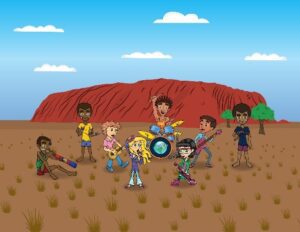By Dr Charles Margerison – Psychologist
Michelle D. Ravenscroft – Educator
How can we best help students to develop their ‘can do’ abilities? This is central to intercultural learning and character development. We can do this as part of learning with and from people from other cultures.
Cultural awareness is learned through the development of an understanding of cultural heritage and identity. By providing the opportunity to consider cultural aspects that would not necessarily be discussed in everyday activities, students can go beyond language to consider different perspectives to encourage empathy and understanding of cultural practices, and a tolerance of differences.
Teachers have indicated there is a need for more practical classroom resources that they can use to achieve their learning objectives. This article outlines practical examples used in classrooms. These provide helpful guidelines to both educators and students.
It is important to understand and make positive relationships with people from different countries and cultures. This reflects the aim set forth by the Council for Europe White Paper on Intercultural Dialogue, which indicates the importance of improving the confidence and competence of students. Also, in the UNESCO Universal Declaration of Cultural Diversity, the founding member states declare as indispensable the ‘wide diffusion of culture and the education of humanity for justice and liberty and peace’ (UNESCO).
Conducted in primary schools with students between the ages of 7 and 11, our applications are based on a virtual musical ensemble called the Can Do Kids Band (CDK Band). The band consists of five students who have the ability to play the music of any country they visit. Their philosophy is to ‘follow the music and learn’.

The characters represent different cultures from around the world. Their musical tastes and abilities reflect both their cultural heritage and world influences. Ravi hails from India and plays the guitar in the band. Ace is the drummer, and comes from Africa. He has an understanding of international cultural rhythmic beats. Amy, born in America, is the singer of the band. She is influenced by a wide range of genres, from jazz through to modern melodies and rap. Lin comes from China and plays keyboard. Oz, who plays guitar, was born in Europe and now lives in Australia. He is influenced by many traditional genres.
The CDK Band visit many countries. Students interact with the band via online ebooks that reflect their travels. This medium means the students can read the lyrics and sing along if they wish. The website also provides resources and interactive quizzes about the countries, plus learning activities that develop cultural and musical awareness. These interactive resources help students to better understand what is meant by culture by creating an awareness of cultural practices, and celebrating both the differences and similarities in each community.
Most children love to explore, and building pupil self-confidence is the underlying focus of these resources. The ‘follow the music and learn’ approach of the Can Do Kids Band enables students to develop their curiosity at the same time as building their confidence. The resources provide the opportunity for students to explore a diverse range of cultures, as well as their own.

This approach facilitates student personal development and achievement, as they explore the countries and complete the quiz questions relating to each one. It enables them to understand how people in other countries live. Increased intercultural awareness is an important learning objective. This can be achieved through student involvement with the explorations and adventures of the band, as they tour and play the music of Russia, Brazil, Japan, Australia, India, France, Mexico and many other nations.
The ‘Can Do’ attitude of the band provides an example of a positive approach to exploration and learning. By having a positive, ‘Can Do’ approach students will be more willing to explore and test ideas and applications. As the activities accessed by the pupils require an increasing amount of independence, so do the role-models that encourage this behaviour. Role-models that display positive character traits, such as high self-esteem and self-confidence, can influence pupils by encouraging independent enquiry. This attitude can be transferred to different areas of learning, and can encourage the exploration of the lives and culture of people and communities from around the world.
We have carried out some studies of the resources in live classroom settings as follows. These activities demonstrate the wide areas where CDK Band resources can be used in any classroom setting to provide cross curricular education:
The Key Stage 2 topic for the half-term was Brazil. In the classroom, before the outdoor learning session began, the pupils watched a video of the Can Do Kids Band. The 5 minute clip showed pictures and videos of Brazilian life and locations, to the soundtrack of the band singing an informative and energetic song in the Brazilian style.
The pupils immediately engaged with the resource, enjoying the ‘cool’ music, and commenting on the name of the band. The song includes the line ‘We are the Can Do Kids, we can fly to any land’, inferring curiosity and confidence. The characters’ reference to their ability to go anywhere was not lost on the pupils, with one stating ‘They are the Can Do Kids, they can do things!’, to which it was replied, ‘Yes, they can do things, and so can you!’. This indicated immediately that the children were identifying with the role-models.
The characters in the video provided motivated, curious and self-confident peer role-models through their positive and inquisitive outlook. Their ability to visit any country and experience the exciting cultural aspects, encouraged the pupils to go out and explore the outdoor area with a ‘Can Do’ attitude and an awareness of their surroundings. The pupils were enthused and excited to be exploring the outdoor area in a way similar to the Can Do Kids Band’s visit to Brazil.
A further application was conducted by Laura Eriksen, a year 3 teacher from Wales. The topic for the term was natural disasters and the learning objective was to locate geographically where these occur.
The topic of natural disasters was introduced through the Can Do Kids Band resources. China and Australia were explored virtually via the ebooks. The year 3 children enjoyed the ‘awesome’ music, the rhyming lyrics, and the band members’ accents.

Laura reported that seeing the world through the eyes of the Can Do Kids Band was an important aspect of learning. The children felt they could follow the band on their travels, for example to the beaches of Australia, and this helped the children with the related classroom activities, in particular their geography tasks. The supporting lesson content was also used to initiate discussion about natural disasters that occur in China, and its geography and climate, and the children were particularly interested in learning about the Himalayas.
An interesting application has also been conducted by Brad Hutchins, a primary school teacher in Queensland, Australia. He used it in a session that focused on the comparison of people living in different countries. His project notes reflect his view of the student experience:
“The response was great, very positive, with students immediately caught by the catchy theme songs and eager to learn more about the characters and their adventures. I observed great engagement, with students glued to the screen, as they discovered a new absorbing educational resource. Using music to facilitate learning in young students is a great way of getting them involved, interested and active without having them feel like they are working hard or feeling any pressure of ‘school work’”.
In addition, we have provided access to individual students participating in home-schooling and Tutoring classes. The students involved are between the ages of 10 and 12. The website enables them to explore 6 countries with the Can Do Kids learning resources. These include visits to France, Brazil, England, Greece, USA and Germany. Students were asked to indicate how long it took them to study each country and the reactions to each one.
Their feedback indicated that it took approximately 30 minutes to explore the resources linked to each of the countries. Normally they covered 1 or 2 countries in a session. They were very motivated to return to the website and visit the other countries to complete the quizzes and exercises, and to gain the passport associated with those activities. The students were engaged and self-motivated and completed all 6 of the country visits without being supervised. Their verbal responses indicated a high level of interest and learning about people from different countries, their culture, music and way of life.
We have also commenced interviews with parents. The initial responses indicate the parents are pleased that the Can Do Kids Band website provides a fun, educational activity to give their children a wider view of the world in a format that they can self-manage.
The case applications have illustrated the enormous interest the students have in both the countries visited and the different styles of music, such as the samba, the waltz, rap, jazz, and modern styles. The examples below provide a short overview of the applications that each educator can fit into their lessons. These can relate to a range of curriculum areas, including history, geography, music, and intercultural learning.

In the first case study, the approach combined classroom learning with an outdoor application. The pupils had participated in some sessions in the classroom relating to the topic. This was extended to learning in an outdoor session that focused on exploring the area and building confidence.
The link between the 5 minute video introduced the students to both the music of Brazil and locations, such as the Amazon River and forest. These helped the students identify with the places and the people. It was clear from the discussions and conversations the students developed their ability to compare their own situation with that of others. They commented upon the differences and similarities.
It was also clear that the students understood the importance of having a positive attitude, as exemplified through the ‘Can Do Spirit’ of the band. Although they realized that this was a virtual tour, the approach definitely raised their interest in how people in different cultures live and gave the opportunity to discuss different forms of dress and types of food eaten; plus, the music and dances of the people in Brazil. This curiosity was replicated in the way the students enthusiastically engaged with the outdoor area.
Therefore, a major learning point was that this virtual travel story approach can support the following activities:
By drawing on their self-confidence and curiosity, the pupils immersed themselves in the learning opportunity and achieved their goals. They also developed a self-awareness; that they could have a positive attitude, and identify with the role-models in the CDK band, who also possessed this trait.
The Can Do Kids Band resources encourage the awareness of cultural diversity, yet can easily form part of a session with a focus on character development. Introducing the video at the beginning of the session provided the opportunity for both the name of the band and their confident attitude to be of inspiration to the pupils. The Can Do Kids Band series includes audio, video and textual resources that encourage exploration of cultures. This facilitates the development of students’ abilities to think beyond their own country and to develop self-confidence in exploring new ideas and opportunities.

Acknowledgements
Co-Author – Michelle D. Ravenscroft has taught for many years at pre-school and primary levels and is now involved as an educational resource developer.
Laura Eriksen, Mold, Wales.
Brad Hutchins, Queensland, Australia.
References
UNESCO (2001) UNESCO Universal Declaration on Cultural Diversity, available at http://www.unesco.org/new/fileadmin/MULTIMEDIA/HQ/CLT/pdf/5_Cultural_Diversity_EN.pdf
White Paper on Intercultural Dialogue “Living Together As Equals in Dignity” (2008), available at https://www.coe.int/t/dg4/intercultural/source/white%20paper_final_revised_en.pdf
Society for Intercultural Learning and Training and Research, available at

Dr Charles Margerison, President and founder of Amazing People Worldwide, is a Psychologist. He is also President of Amazing People Schools. Dr Margerison has consulted widely for major organizations in the fields of organizational and educational psychology. He was previously Professor of Management at Cranfield University, UK, and the University of Queensland, Australia. He founded Amazing People Worldwide in 2006 and is supported by a dedicated global team. He previously co-founded Emerald Publications, and Team Management Systems and has authored more than 30 books. Dr Charles is also the creator of ‘Can Do Kids Worldwide, a virtual music group that helps students to learn about countries and cultures through music. He has also developed Imagineland, for early learners. You can follow him on Linked in .
For more information, please email info@amazingpeopleworldwide.com
Websites:



Copyright © 2021. Amazing People Worldwide.
All Rights Reserved.
This site is protected by reCAPTCHA and the Google
Privacy Policy and Terms of Service apply.



